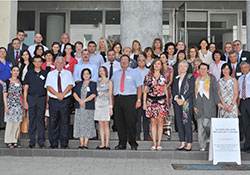Countries of south-eastern Europe build capacity in global health diplomacy

oart.hu
Representatives of countries of the South-eastern Europe Health Network (SEEHN) gathered in Debrecen, Hungary on 21–25 August 2012 to participate in a global health diplomacy executive course to explore their common interests in health as a foreign policy issue.
During the course, diplomatic and health professionals from the SEEHN countries:
- learned more about the key characteristics and evolution of health and foreign policy, and the synergy between these two domains that is developing new relationships for global health diplomacy;
- explored the multilateral landscape of global health, including how various environments and actors affect the way that global health is governed at different levels;
- improved their negotiation skills through practical simulation exercises focusing on the European Union context and role play exploring negotiations on alcohol policies; and
- gained a greater understanding of the issue of Roma health across borders.
“Diplomacy is undergoing profound changes in the 21st century and global health is one of the areas where this is most apparent. The negotiation processes that shape and manage the global policy environment for health are increasingly conducted not only among public health experts representing health ministries of nation states, but also by diplomats, philanthropists, business people, civil society and many new forms of public–private partnerships,” commented Professor Ilona Kickbusch, one of the course co-directors.
The course is part of an initiative to build capacity in global health diplomacy in the countries of the WHO European Region, as proposed in the WHO Regional Committee for Europe resolution EUR/RC60/R6. It brought together participants from the SEEHN countries (Albania, Bosnia and Herzegovina, Bulgaria, Croatia, Israel, Montenegro, the Republic of Moldova, Romania, Serbia and the former Yugoslav Republic of Macedonia), as well as from the host country, Hungary.
Course participants stressed the importance of WHO leadership and support, from the subregional cooperation in public health initiated through SEEHN to its work towards Health 2020.
“As health moves beyond the purely technical to become an ever more critical element in foreign policy, security policy and trade agreements, new skills are needed to negotiate global regimes, international agreements and treaties, and to maintain relations with a wide range of actors,” said Professor Rόza Ádány, co-director.
The course was organized by the Global Health Programme of the Graduate Institute of International and Development Studies in Geneva, Switzerland and the Faculty of Public Health, University of Debrecen, Hungary in collaboration with the SEEHN Executive Committee, and with support from WHO/Europe. Its co-directors, Professor Ilona Kickbusch, Professor Rόza Ádány and Dr Mihály Kökény, were joined by senior experts from the European Union, Hungary and Sweden.



